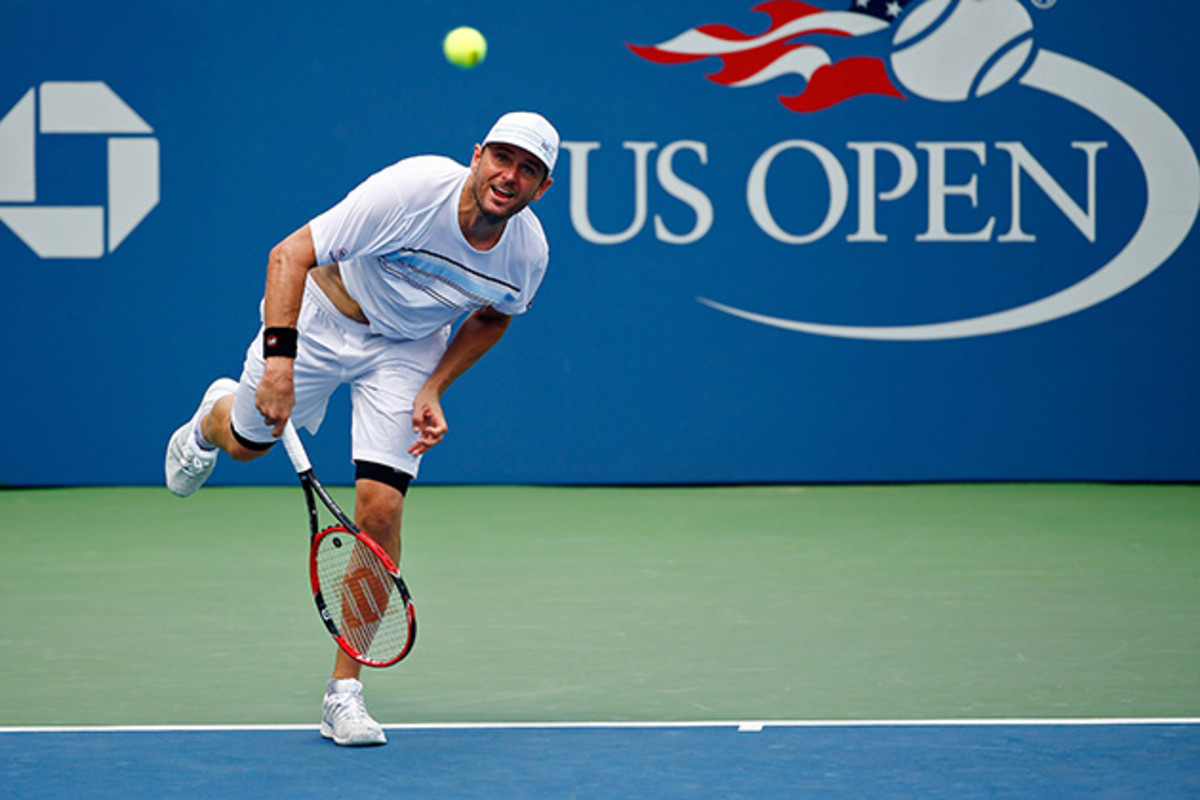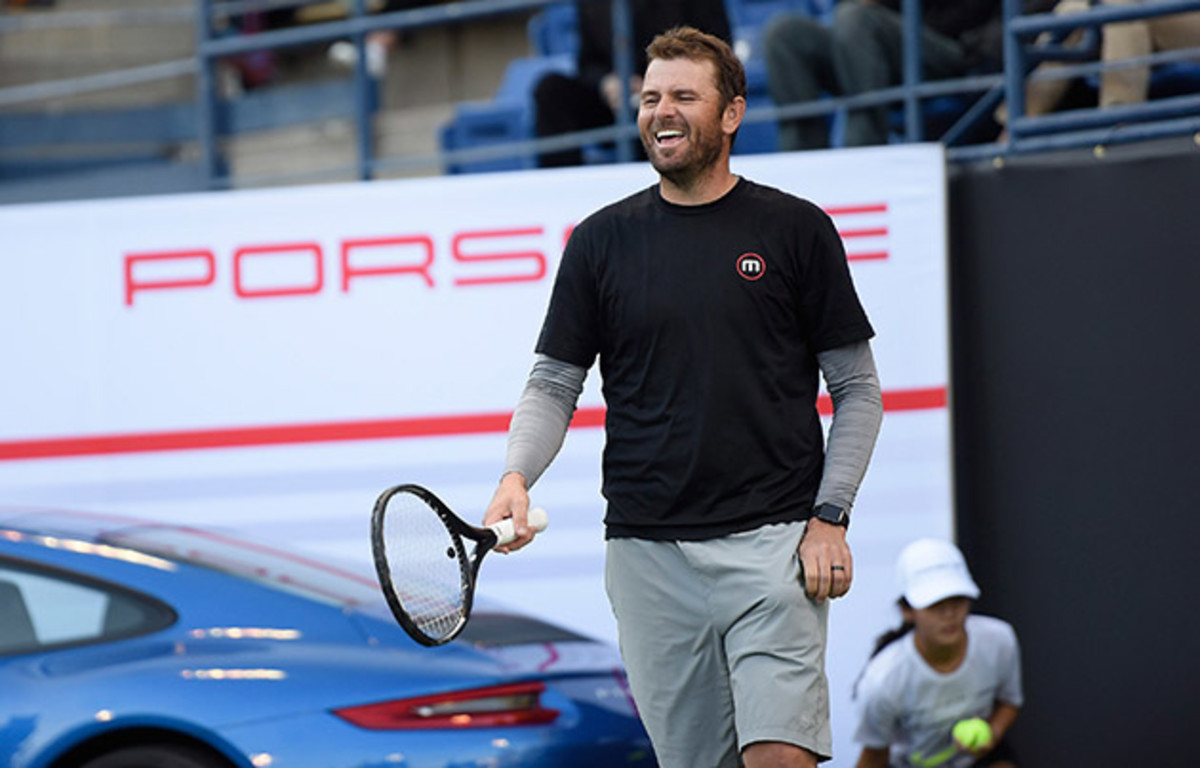One year after retirement from tennis, Mardy Fish has found his way

Nearly a year after his last official tennis match, Mardy Fish has discovered his happy formula of the post-professional athlete retired lifestyle: odd jobs and family time, mixed with golf and a little bit of tennis.
“Life today is a lot less stressful, that’s for sure,” Fish says. “It’s a lot easier. I love it. It’s great to be home. It’s great to be with family all the time. There are a lot of things I certainly don’t miss. I do miss the competition and some of that related stuff.”
His preferred version of the retired life might not sound exceptional to some, but for Fish, it’s a momentous step in the best of directions.
A talented athlete who didn’t realized his Top 10 potential until late in his career, Fish was in his early 30s, lean and fit, finally more focused and determined than anytime in his career.

But then life delivered an unexpected blow: Fish developed heart arrhythmia. While he eventually underwent successful corrective surgery, the incident left him with an unwanted side effect: severe anxiety disorder. It would cripple his career and push him off the court for the entirety of 2014.
In the end, in a stroke of slight good fortune, Fish was able to leave tennis on his own terms, doing a mini-farewell summer tour last year, with the 2015 U.S. Open serving as his final stop.
What came next was the need to establish an identity beyond being a professional athlete, something many retired athletes struggle with. But in less than a year, the 34-year-old has found his way.
At times he’s working with a number of up-and-coming American tennis talent, other times he’s hitting the links, where his athletic prowess shines through his sublime golf swing.
This summer he’s planning on going back on the court to play a couple of weeks of World Team Tennis for the Washington Kastles. But that will be the extent of his return to the game he played for more than a decade.
“What don’t I miss about tennis?” says Fish. “Oh man, the road, the airports, the rain delays, the scheduling, the knots in your stomach, not being able to eat. Things like that….I went to a few events with the guys from the USTA. There were a couple of rain delays and practice court kind of stuff and I was like, ‘Man, I do not miss this at all.’”
Fish, however, is a jock at heart and seeks the occasional adrenaline rush. As it turns out, golf fulfills that need perfectly. It’s actually not a new endeavor—he won the Vero Beach City Championships when he was 14. Most importantly, the sport’s been instrumental in helping Fish climb out of the deep hole of his anxiety disorder. But golf quenches his desire for competition, without the need for professional validation.
• Appreciating Andy: After Wimbledon triumph, Murray’s best is still to come
“It’s how I get my competitive juices going, still,” Fish says. “I love playing competitive golf because it’s really the only thing left that I’m still pretty good at. I was really good at tennis and now I’m not very good anymore. I’m pretty good at golf and I enjoy trying to get better and learning without the stress on your body, without having to be in incredible physical shape.”

While Fish has dabbled in PGA qualifying school and playing the U.S. Open qualifying—the golf version, not tennis, of course—he’s insistent his interest is primarily casual. What he has attained is a label as one of the most feared participants on the celebrity golf circuit.
This weekend, Fish is considered by many to be the favorite to take the American Century Championships title in Tahoe, Calif., a made-for-TV event broadcast on NBC.
The belief that Fish could be the guy to beat is bolstered by the fact he won the similar-styled Diamond Resorts Invitational in Orlando, Fla., earlier this year. The event employs a Modified Stableford point scoring system where players earn six points for an eagle, three points for a birdie, one point for par, zero points for a bogey, and minus-two points for a double-bogey or anything sadly beyond.
.@ACChampionship start tmrw! Fun practice rd with @StephenCurry30 and Pops Dell C! #AaronRodgers #luxurybusinessjets pic.twitter.com/jydsnmoSzW
— Mardy Fish (@MardyFish) July 22, 2016
In Orlando, where his tennis-teaching pro dad, Tom, was on his bag, Fish won the par-72, 6,521-yard course with a score of 79. He started the final day with a nine-point lead, and shot five birdies in the final round, including on the first and last holes.
It’s worth noting that while it was not a PGA event, Fish’s winner’s paycheck was pro worthy: he banked a cool $100,000 for the win.
• Jim Courier fuels competitive desire with captaining U.S. Davis Cup team
“The satisfaction was probably a little bit more when I won some of my six tennis tournaments just because that was my real job,” he says. “But everyone is competitive—a lot of the guys are really good players. It’s really fun and almost everyone at these things checks their egos. I wish there were more of these events.”

Former American pro James Blake, a close buddy of Fish’s, is also on tap to play at the American Century Championships. Blake has no illusions of grandeur, understanding his golf skills don’t add up to par like Fish’s.
“I have no chance of winning, but he does,” Blake says, laughing. “I played it last year and finished around 30 in the middle of the pack. I did well for me, but I’m not expecting to go in there and win it ever. Mardy, however, is that talented. It’s just like his backhand—he has a very natural swing.”
Blake, a Los Angeles neighbor of Fish’s, believes his friend has come through the tough times and has found peace of mind in his post-tennis career.
• Mailbag: Does Olympic tennis help or hurt the sport's growth?
“Mardy was so used to being regimented and doing all the things he had to do to be on tour,” Blake says. “When that’s no longer there it could be tough at the beginning. I think he’s found his way of keeping busy and filling time. I think in the looking back you realize the kind of pressure we put on ourselves when you’re out here. “
“When you’re doing it, it might seem normal, but it was a pretty unique career. Now he’s trying to live a little more of a normal life and I think he’s really good with where he’s at.”
#Nevertooearly to start playing #golf. @MardyFish and his 2-yo son warming up for a big day ahead @ACChampionship pic.twitter.com/DKYCGPWEkB
— Topgolf (@Topgolf) July 20, 2016
Without a doubt, Fish is content with family life. He and wife, Stacey, have one son with a new baby on the way. For now, he isn’t looking for a full-time commitment but did leave the door cracked a bit to a possible, more professional approach to his future in about 16 years from now.
“I could see, maybe, when I’m 50 trying to go out for the golf senior tour,” he says. “Right now, I’m just playing to enjoy it. I certainly don’t have the time or the love to practice. I’ve done it my whole life with tennis and I kind of rebel a little from putting in the long hours to try and get better at golf. At least that’s how I feel now.”
